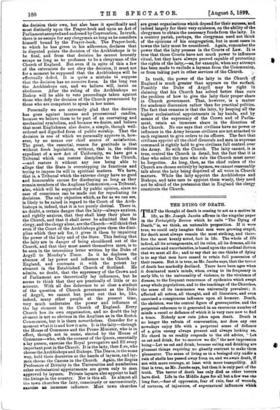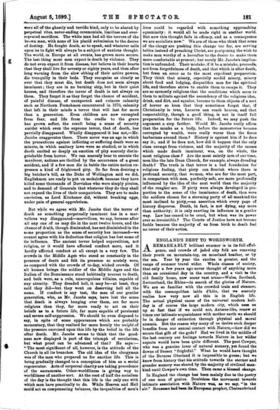THE DYING OF DEATH. T HAT the thought of death is
ceasing to act as a motive in life, as Mr. Joseph Jacobs affirms in the singular paper in the Fortnightly Review which he calls "The Dying of Death," is, we think, an untenable proposition. If it were true, we could only imagine that men were growing stupid, for death must always remain the most striking, and there- fore the most keenly noted, fact in life. The whole of life indeed, all its arrangements, all its rules, all its dreams, all its certainties and uncertainties, is based upon the cardinal dictum that we must all die; and to say that no one thinks of dying is to say that men have ceased to retain full possession of their reason. But it is true, as Mr. Jacobs says, that the terror of death has markedly declined. There have been ages when it dominated men's minds, when, owing to its frequency in early life, to the universality of violence, to the virulence of disease, to the frequent recurrence of epidemics which swept away whole populations, and to the teachings of the Ohurches, the sense of its imminence was universally prevalent ; it affected all action, all thought, and all literature, and even exercised a conspicuous influence upon all humour. Death; the skeleton, was the central figure of grotesqueries, and the perpetual reference to it generated in an enormous number of minds a recoil or defiance of which it is very rare now to find a trace. Nobody now cuts jokes upon death. Death is no longer the refrain of conversation, nor does any one nowadays enjoy life with a perpetual sense of defiance of a grim enemy always present and always looking on. No chord in us readily responds to the old advice, Let us eat and drink, for to-morrow we die," the new impression being—Let us eat and drink, because eating and drinking are pleasant things requiring no ghastly contrast to make them pleasanter. The sense of living as in a besieged city under a rain of shells has passed away from us, and we await death, if not with more courage, at least with more tranquillity. All that is true, as Mr. Jacobs says, but then it is only part of the truth. The terror of death has only died as other terrors have died. Life in the Middle Ages for all but a few was one long fear,—fear of oppression, fear of ruin, fear of wounds, of tortures, of injustices, of supernatural influences which were all of the ghastly and terrific kind, only to be abated by perpetual rites, never-ending ceremonials, limitless and ever- repeated sacrifices. The white man had all the terrors of the brown man, with none of his placid submission to the decree of destiny. He fought death, so to speak, and whatever calls upon us to fight will always be a subject of anxious thought. The world, in Europe at all events, has grown more secure. The last thing most men expect is death by violence. They do not even expect it from disease, but believe in their hearts that they shall live for seventy or eighty years, and then after long warning from the slow ebbing of their active powers, die tranquilly in their beds. They recognise as clearly as ever that they must die, but death does not seem always imminent; they are in no burning ship, but in their quiet houses, and therefore the terror of death is not always on them. They forget it as they forget the chance of accident, of painful disease, of unexpected and ruinous calamity such as Northern Frenchmen encountered in 'KO, calamity that left in their minds a terror that will last for more than a generation. Even children are now exempted from fear, and life from the cradle to the grave has grown softer, the result being a sense of security amidst which even the supreme terror, that of death, has partially disappeared. Wholly disappeared it has not,—Mr. Jacobs exaggerates there. There never was an age in which the precautions against inflicting or suffering death were so minute, in which sanitary laws were so studied, or in which death excited so deeply an emotion of pity scarcely distin- guishable from horror. We can scarcely bear to execute the murderer, nations are thrilled by the occurrence of a great accident, and if a few men die in battle the entire nation ex- presses a kind of frightened pity. So far from desiring a big butcher's bill, as the Duke of Wellington said we did, Englishmen are ready to put on sackcloth because they have killed some thousands of Dervishes who were simply pirates, and to demand of Generals that whatever they do they shall not expend the lives of their compatriots. They are to make omelettes, as Lord Kitchener did, without breaking eggs, under pain of general opprobrium.
But while we agree with Mr. Jacobs that the terror of death as something perpetually imminent has in a mar- vellous way disappeared—marvellous, we say, because after all any one of us may die in the next twelve hours, and the chance of death, though diminished, has not diminished in the same proportion as the sense of security has increased—we cannot agree with his deduction that religion has lost some of its influence. The ancient terror helped superstition, not religion, or it would have affected conduct more, and it hardly affected conduct at all except in a very few. The crowds in the Middle Ages who stood so constantly in the presence of death and felt its presence so acutely were, as compared with the crowds of to-day, wicked crowds. Of all human beings the soldier of the Middle Ages and the Italian of the Renaissance stood habitually nearest to death, and both were, as a rule, unscrupulous villains, capable of any atrocity. They dreaded hell, it may be—at least, they said they did—but they went on deserving hell all the same. If conduct is any test, the men of our gentler generation, who, as Mr. Jacobs says, have lost the sense that death is always hanging over them, are far more religious than they, far more ready to act on their beliefs as to a future life, far more capable of persistent and severe self-suppression. We should be even disposed to say, in spite of some appearances which are probably momentary, that they realised far more keenly the weight of the pressure exercised upon this life by the belief in the life after death. Mr. Jacobs seems to think that the good- ness now displayed is part of the triumph of secularism, but what proof can be advanced of that? He says :- " The most significant of all, however, is the attitude of the Church in all its branches. The old idea of the clergyman was of the man who prepared us for another life This is being gradually changed to a conception of him as a social regenerator. Acts of corporeal charity are taking precedence of the sacraments. Other-worldliness is giving way to worldliness of another sort. At the root of half the socialism of the day is the thought that this life is the only one with which men have practically to do. While Heaven and Hell could act as compensating balances, the inequalities of men's lives could be regarded with something approaching equanimity : it would all be made right in another world. But now this thought fails in efficacy, and as a consequence we are socialists now." We are of those who think that some of the clergy are pushing this change too far, are serving tables instead of preaching Christ, are postponing the wish to make men worthy of a hereafter to the desire to make them more comfortable at present; but surely Mr. Jacobs's implica- tion is unfounded. Their mistake, if it be a mistake, proceeds, not from forgetfulness of death, and that which is after death, but from an error as to the most expedient preparation. They think that misery, especially sordid misery, misery about food and lodging, disqualifies men for the spiritual life, and therefore strive to enable them to escape it. They are so earnestly religions that the conditions which seem to them to militate against the ascendency of the religious idea, drink, and dirt, and squalor, become to them objects of a sort of horror so keen that they sometimes forget that, if Christianity is true, Lazarus can reach heaven, and that respectability, though a good thing, is not in itself full preparation for the future life. Indeed, we may push the argument a step farther. Would Mr. Jacobs really affirm that the monks as a body, before the monasteries became corrupted by wealth, were really worse than the fierce barbarians around them ? History is against him if he does say it ; and if he does not, how did it happen that the only class exempt from violence, and the majority of the causes which made death imminent, was, on the whole, the most religions class P Are the most saintly men of our time, men like the late Dean Church, for example, always dreading death ? The truth is that terror is a bad foundation for religions feeling, that piety can flourish where there is profound security, that women, who are for the most part, in comparison with men, perfectly safe, are more profoundly influenced by the idea of the next world than the majority of the rougher sex. If piety were always developed in pro- portion to the sense of the imminence of death, then were the soldiers chosen for a storming party of all mankind the most inclined to piety,—an assertion which every page of history disproves. Death, in fact, is not dying, any more than authority; it is only exerting its influence in a gentler way. Law has ceased to be cruel, but when was its power ever so irresistible 7 The Courts of Justice have not become feeble because the majority of us from birth to death feel no terror of their action.



































 Previous page
Previous page